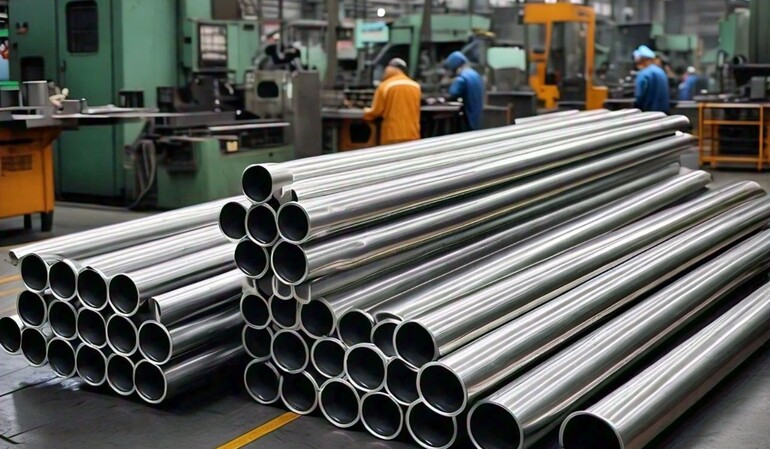- No.3, 327 S.V.P.Road, Makharai House, Mumbai- 400004, INDIA
- sales@ariesalloys.com
Titanium Pipe & Tube Blog
- Home
- Titanium Pipe & Tube Blog

Titanium Pipes and Tubes: Types, Benefits, and a Story of Engineering Triumph
Titanium is one of the most sought-after metals in modern engineering due to its exceptional strength, corrosion resistance, and lightweight properties. Among its many applications, titanium pipes and tubes play a crucial role in industries such as aerospace, marine, chemical processing, and medical devices. In this blog, we will explore the different types of titanium pipes and tubes, their benefits, and conclude with an inspiring real-world story that highlights their importance.
Types of Titanium Pipes and Tubes
Titanium pipes and tubes come in various grades and structures, each designed for specific applications. Below are the most common types:
1. Seamless Titanium Pipes and Tubes
Seamless pipes and tubes offer superior strength and corrosion resistance, making them ideal for high-pressure applications in aerospace, chemical processing, and marine industries.
2. Welded Titanium Pipes and Tubes
Welded pipes and tubes are manufactured by rolling and welding titanium sheets. They are cost-effective and commonly used in industries where high pressure and temperature are not a concern.
3. Heat Exchanger Titanium Tubes
These tubes are designed specifically for use in heat exchangers, where they provide excellent thermal conductivity and resistance to corrosive environments such as seawater and chemical plants.
4. Capillary Titanium Tubes
Capillary tubes are small-diameter tubes used in medical devices, precision instruments, and specialized industrial applications where high precision is required.
5. Condenser Titanium Tubes
Condenser tubes are widely used in power plants and desalination facilities, where their resistance to corrosion and high temperatures ensures efficiency and longevity.
Titanium pipes and tubes come in various grades and structures, each designed for specific applications. Below are the most common types:
1. Seamless Titanium Pipes and Tubes
Seamless pipes and tubes offer superior strength and corrosion resistance, making them ideal for high-pressure applications in aerospace, chemical processing, and marine industries.
2. Welded Titanium Pipes and Tubes
Welded pipes and tubes are manufactured by rolling and welding titanium sheets. They are cost-effective and commonly used in industries where high pressure and temperature are not a concern.
3. Heat Exchanger Titanium Tubes
These tubes are designed specifically for use in heat exchangers, where they provide excellent thermal conductivity and resistance to corrosive environments such as seawater and chemical plants.
4. Capillary Titanium Tubes
Capillary tubes are small-diameter tubes used in medical devices, precision instruments, and specialized industrial applications where high precision is required.
5. Condenser Titanium Tubes
Condenser tubes are widely used in power plants and desalination facilities, where their resistance to corrosion and high temperatures ensures efficiency and longevity.
Benefits of Titanium Pipes and Tubes
Titanium pipes and tubes offer several advantages over traditional materials like steel or aluminum:
- Corrosion Resistance: Titanium pipes and tubes are highly resistant to corrosion from seawater, chemicals, and harsh environments, making them perfect for marine and chemical processing industries.
- High Strength-to-Weight Ratio: Titanium is as strong as steel but about 45% lighter, providing significant weight savings in aerospace and industrial applications.
- Biocompatibility: Due to their non-toxic and non-reactive nature, titanium pipes and tubes are widely used in medical implants and surgical instruments.
- High-Temperature Resistance: They maintain their strength even at high temperatures, making them suitable for power generation and aerospace applications.
Titanium pipes and tubes offer several advantages over traditional materials like steel or aluminum:
- Corrosion Resistance: Titanium pipes and tubes are highly resistant to corrosion from seawater, chemicals, and harsh environments, making them perfect for marine and chemical processing industries.
- High Strength-to-Weight Ratio: Titanium is as strong as steel but about 45% lighter, providing significant weight savings in aerospace and industrial applications.
- Biocompatibility: Due to their non-toxic and non-reactive nature, titanium pipes and tubes are widely used in medical implants and surgical instruments.
- High-Temperature Resistance: They maintain their strength even at high temperatures, making them suitable for power generation and aerospace applications.
A Story of Engineering Triumph: How Titanium Pipes and Tubes Transformed a Desalination Plant
In 2020, a major desalination plant in the Middle East faced significant operational challenges due to the corrosion of traditional steel pipes, which led to frequent breakdowns and high maintenance costs. The plant engineers decided to replace the steel pipes with titanium pipes and tubes.
The results were groundbreaking. The titanium pipes demonstrated exceptional corrosion resistance and significantly improved the plant's efficiency. The need for frequent repairs was eliminated, and the overall operational costs were reduced by 50%. The plant's ability to produce fresh water increased, benefiting thousands of people in the region.
This success story showcases how investing in high-quality titanium pipes and tubes can significantly improve the efficiency and reliability of critical infrastructure.
Conclusion
Titanium pipes and tubes are an excellent choice for industries that require durability, corrosion resistance, and lightweight properties. Whether you’re in aerospace, marine, or chemical processing, using the right type of titanium pipes and tubes can enhance efficiency and reduce long-term costs. The story of the desalination plant is just one example of how this exceptional material continues to revolutionize engineering and industrial applications worldwide.
Titanium pipes and tubes are an excellent choice for industries that require durability, corrosion resistance, and lightweight properties. Whether you’re in aerospace, marine, or chemical processing, using the right type of titanium pipes and tubes can enhance efficiency and reduce long-term costs. The story of the desalination plant is just one example of how this exceptional material continues to revolutionize engineering and industrial applications worldwide.
